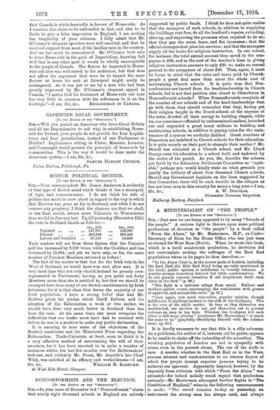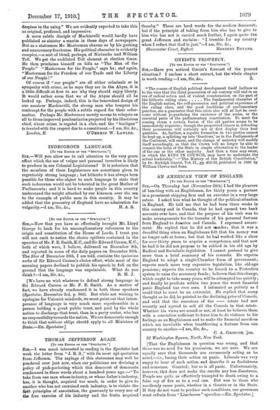A 1dINISTERIALIST ON "THE PEOPLE.'
[To THE EDITOR OP TRW `. SPECTATOR:1
Sru,—Just now we are being appealed to by many " friends of the people." A curious light is thrown upon some political professions of devotion to "the people" by a book called "From the Abyss," by Mr. Masterman, kLP., ex-Under- Secretary of State for the Home Office, who has just been re-elected for West Ham (North). When he wrote this book, which is a lurid amateurish production, he doubtless did not contemplate seeking the suffrages of the East End populations whom in its pages he thus describes :—
" In the Abyss [that is, in the poorer parts of London, including the East End, the Mile End Road, being specially mentioned in the book] public opinion is indifferent or wearily tolerant. A murder arouses transitory interest but little condemnation. We do not greatly concern ourselves if our neighbours knife each other in the dark?' (p. 66.)
"The fight is a welcome refuge from ennui. Fathers and mothers gather round, encouraging the combatants with grunts of approval, and animal-like cries. (p. 67.)
"Once again, you most remember, popular opinion, though indifferent, if anything inclines to the side of the hooligans. This is the crux of the whote matter. So long. as they themselves are tradistarbed, oar workers de not put themselves out te prevent outrages on men in top hats. Whether the hooligans kill each other or kill stray citizens" (continues Mr. Masterman) "is much the same to us" (playfully identifying himself with the inferior race). (p. 69.) It is hardly necessary to say that this is a silly calumny. As a politician, the author of it, however old he grows, appears
to be unable to shake off the imbecility-of the schoolboy. The working population of London are not in sympathy with crime, even in the poorest slums. The use of the knife is rare. A murder, whether in the East End or in the West,. arouses interest and condemnation to an intense degree of which few people (except superior persons trying to be authors) are ignorant. Apparently inspired, however, by the impunity from criticism with which "From the Abyss" was attended—for indeed nobody could regard that production seriously—Mr. Masterman attempted further flights in "The Condition of England,' wherein the following announcement is made : "The crowd remains to-day as yesterday, an instrument the strong man has "always used, and always despises in the using." We are evidently expected to take this as original, profound, and impressive.
A. more subtle disciple of Machiavelli would hardly have published so sinister a maxim in these days of newspapers. But as a statesman Mr. Masterman charms us by his gushing and unnecessary frankness. His political character is evidently complex,—a sort of blend, perhaps, of Nietzsche and William Tell. We get the undiluted Tell element at election times. He then proclaims himself on bills as "The Man of the People." "Masterman for the People," says he; and again, "Masterman for the Freedom of our Trade and the Liberty of our People !"
Of course if "our people" are all either criminals or in sympathy with crime, as he says they are in the Abyss, it is a little difficult at first to see why they should enjoy liberty. It would rather seem that we of the Abyss should all be locked up. Perhaps, indeed, this is the benevolent design of our amateur Machiavelli, the strong man who tempers his contempt for the people with a subtle regard for their refor- mation. Perhaps Mr. Masterman merely means to relegate us all to those improved penitentiaries projected by his illustrious chief, where crime is regaled in a club, and the "hooligan" is treated with the respect due to a constituent.—I am, Sir, &c.,























































 Previous page
Previous page